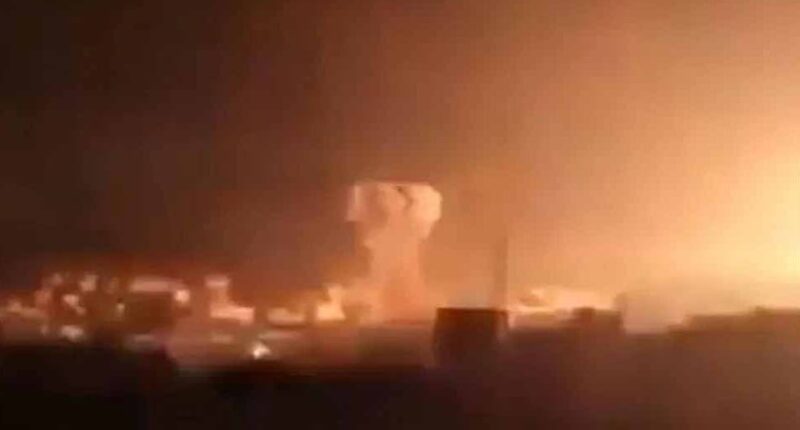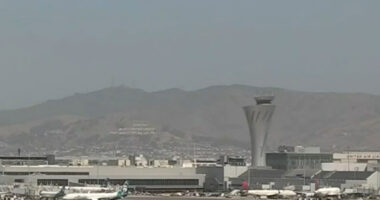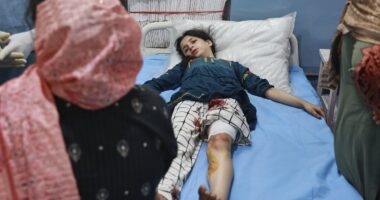
Donald Trump labeled the escalating tension between India and Pakistan as a ‘shame’ when informed about the recent clashes between the two nuclear-armed nations.
Expressing his concerns to reporters on Tuesday, Trump remarked, ‘It’s a shame. We just heard about it. They’ve been fighting for a long time … I just hope it ends very quickly.’
Following New Delhi’s airstrike on what it termed ‘terrorist camps’ in retaliation for a deadly attack, India and Pakistan found themselves on the brink of a potential conflict earlier today, with Islamabad issuing strong warnings in response.
Pakistan claimed to have shot down five Indian fighter jets as it condemned an ‘act of war’ from India, vowing to retaliate after missiles hit Pakistan-administered Kashmir.
Both sides exchanged heavy artillery along their contested frontier into Wednesday. Pakistan reported 26 killed by Indian attacks, and India reported 10 killed by Pakistan.
The Indian army said ‘justice is served’, with New Delhi adding that its actions ‘have been focused, measured and non-escalatory in nature’.
But fears of a full-blown conflict between the two nuclear powers have escalated sharply in the last few hours.
India says it was attacking bases used by those it blames for an attack on the Indian-run side of Kashmir last month – the worst massacre of civilians in India since 2008.
It added that ‘no Pakistani civilian, economic or military targets have been hit’ in the missile attacks’ – an assertion sharply rebuked by Pakistani officials.
- India last night struck ‘terror sites’ in Pakistan, responding to a massacre in April
- At least 26 people were killed and 46 injured in Pakistan after India fired missiles
- At least 10 civilians were killed and 32 injured in India after Pakistani fired back
- Pakistan claims to have shot down Indian jets and vows further retaliation
- Follow our live blog for the latest updates on the developing conflict
Fighter jets roared through the skies over the Himalayan territory this morning and explosions could be heard near the ‘Line of Control’ in a strike that lasted 25 minutes.
The Indian government said in a statement in the early hours of Wednesday morning that its armed forces had launched ‘Operation Sindoor’, hitting what it called terrorist infrastructure in ‘Pakistan and Pakistan-occupied Jammu and Kashmir’.
The crisis was triggered by an April 22 militant attack on tourists in Indian-administered Kashmir, which left 26 people dead, mainly Hindu men, in the tourist hotspot of Pahalgam.
Nobody has claimed the attack but New Delhi said the gunmen were from Pakistan-based militant group Lashkar-e-Taiba, a UN-designated terror organisation with a history of carrying out attacks on Indian soil.
The group has long been rumoured to have murky links to the Pakistani military establishment – which Islamabad denies.
Hindu-majority India accuses Islamic Pakistan of funding and encouraging militancy in Kashmir, the Himalayan region both nations claim in full but rule in part.
At least 26 civilians were also killed and 46 injured in India’s missile attack on Pakistani-controlled territory overnight, Pakistan officials said, vowing a tough response.
Islamabad said a three-year-old child was among eight civilians killed in the strikes.
In Muzaffarabad, the main city of Pakistan-administered Kashmir, troops cordoned off streets around a mosque Islamabad said was hit, with marks of explosions also visible on the walls of several homes.
Shaina Nana Chudasama, a former spokesperson for the ruling party in India, the BJP, claimed that ‘no civilians’ had been harmed by the strikes, despite reports of mass casualties, including women and children.
Indian Foreign Secretary Vikram Misri said today that India had intelligence suggesting that ‘further attacks’ were ‘impending’ before they took action.
‘Our intelligence monitoring of Pakistan-based terrorist modules indicated that further attacks against India were impending,’ he said in a briefing on the operation today.
‘There was thus a compulsion both to deter and to pre-empt.’
Misri blamed last month’s attack in Indian-administered Kashmir on ‘Pakistani and Pakistan-trained terrorists’, the BBC reports.
He said it was carried out by The Resistance Front, which he claimed was a front for Pakistani Indian-proscribed terrorist organisation Lashkar-e-Taiba.
Misri said that investigations into the April 22 attack had revealed the ‘communication nodes of terrorists in and to Pakistan’.
He argued that ‘the features’ of the attack on civilians ‘also tie in with Pakistan’s long track record of perpetrating cross-border terror in India’.
India struck nine ‘terror bases’ with missiles late on Tuesday night, before both sides exchanged artillery fire.
It then accused Pakistan of ‘again violating’ a ceasefire agreement by ‘firing artillery in Bhimber Gali in Poonch- Rajauri area,’ on the Indian side.
The army ‘is responding appropriately in a calibrated manner,’ it added.
But fears remain that the conflict could blow up into a full-scale war between the two neighbouring countries.
‘Pakistan has every right to give a robust response to this act of war imposed by India, and a strong response is indeed being given,’ Prime Minister Shehbaz Sharif said.
He said the ‘deceitful enemy has carried out cowardly attacks at five locations in Pakistan’ and that his country would retaliate.
Pakistani Defence Minister Khawaja Muhammad Asif echoed the sentiment, telling AFP the retaliation had ‘already started’, after the military earlier said it would respond ‘at a time and place of its own choosing’.
Indian missiles hit six locations in Pakistan-administered Kashmir and in the country’s eastern Punjab province, killing at least 26 people, including women and children, said Pakistan’s military spokesperson, Lt. Gen. Ahmed Sharif.
Sharif said the Indian jets also damaged infrastructure at a dam in Pakistan-administered Kashmir, calling it a violation of international norms.
Indian media cited officials in saying that seven people, including a woman and two children, had been killed and 38 injured in strikes into Indian territory from Pakistan.
The BBC later said it was able to confirm that at least 10 civilians had died and 32 had been injured in Indian-administered Kashmir following Pakistani artillery shelling.
‘The firing was particularly intense in Poonch and Mehandar regions,’ the broadcaster reported, citing residents.
Homes and shops in the northernmost regions of India were reported to have been badly damaged.
Pakistan was said to have ‘pounded dozens of forward villages with artillery and mortar shelling along the Line of Control in Jammu and Kashmir’.
India’s army accused Pakistan of ‘indiscriminate’ firing across the Line of Control (LoC), the de facto border in Kashmir, with bursts of flame as shells landed, AFP reporters saw.
The strikes came amid soaring tensions between the nuclear-armed neighbors over last month’s militant attack on tourists in the Indian-controlled portion of Kashmir, which killed 26.
India has blamed Pakistan for backing the bloody attack, which Islamabad has denied.
The shooting, which Indian authorities believe was carried out by Pakistani assailants, prompted a flurry of military and diplomatic action as both sides engaged in exchanges of fire along the ‘Line of Control’.
India launched naval drills, test-fired several long-range missile systems and suspended a key treaty that ensures India supplies Pakistan with water from the Indus River, a provision that is crucial for Pakistan’s water supply and agricultural economy.
Pakistan, which has denied any involvement in the attack, deployed its air force to close its airspace to Indian airlines and has mobilised its army.
India identified two of the three April 22 attackers as ‘terrorists’ from Pakistan waging a violent revolt in the Indian-administered but Muslim-majority part of Kashmir.
The majority of the dead were Hindu tourists from India, with reports from witnesses and survivors claiming the gunmen were ordering civilians to recite Islamic prayers and shooting those who were unable to do so.
A Pakistani militant group known as The Resistance Front (TRF) claimed responsibility in the wake of the attack, only to rescind the statement days later and blame the initial claim on a communications breach.
New Delhi said the gunmen were from Pakistan-based militant group Lashkar-e-Taiba, a UN designated terror group long rumoured to have links with the Pakistani military establishment. Islamabad denies to link.
LeT’s main objective is to merge the whole of Kashmir with Pakistan.
Dr. Mohammad Faisal, Pakistan’s High Commissioner to the UK has blasted foreign powers for not intervening sooner to cool tensions between India and Pakistan.
He accused India of attacking civilians and said that retaliation ‘should’ happen.
He told the Today Programme: ‘During the night there were multiple attacks on Pakistan and we have been alerting the world of this eventuality for the last 15 days or so.
‘I have been urging all the international community to intervene, to escalate the situation, to improve the relations. Sadly nothing much has happened.
‘Yesterday Indian attacks have led to 26 deaths of civilians, which includes women and children, young girls, and 46 injured.
‘There is a lot of anger in Pakistan. We have shot down some five planes, three Raphales and Su-30s and two or three drones.’
He confirmed that Pakistan was shelling India, adding: ‘If Pakistan is attacked, we will retaliate. So if from the other side there are bombs and shells falling on our side of course retaliation will be there.
‘Retaliation should also be there for the 26 deaths that have happened, all of civilians. And all during the day today their funerals will be carried out all over Pakistan.
‘This is a cause of grave concern for us and for two nuclear-armed powers.’

















